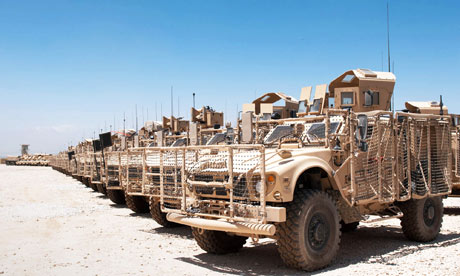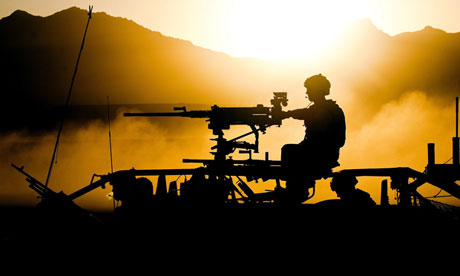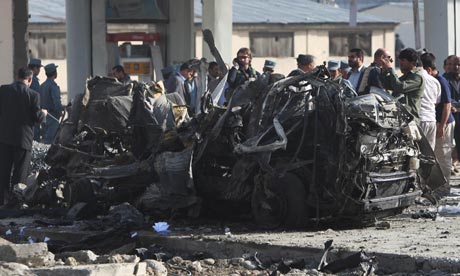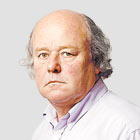http://www.guardian.co.uk/world/2012/sep/18/nato-scales-back-operations-afghans



Nato Afghan strategy in disarray after joint ground operations suspended
Defence secretary called to the Commons after US general suspends joint patrols with Afghan troops

The decision to suspend joint operations, announced in Washington, appeared to take the UK government by surprise. Photograph: Staff Sgt Michael Behlin/AP
The Nato-led military strategy in Afghanistan has been thrown into disarray after joint on-the-ground operations were suspended because of a collapse in trust over the killings of Americans and other Nato soldiers by Afghan government forces.
The move came after a surge in the number of "insider attacks" by Afghan government soldiers and police officers. There have been 36 such attacks this year, which have killed 51 Nato soldiers. The suspension threatens the joint plan to train an effective Afghan army to keep the Taliban at bay after foreign troops pull out.
General John Allen, the US and Nato commander in Afghanistan, ordered a stop to joint combat operations and patrols "until further notice".
The decision, which was announced in Washington, took the UK government by surprise, coming just a day after the defence secretary, Philip Hammond, spoke in defence of Nato's continued work with Afghan troops in parliament. Whitehall sources said British commanders were unaware the announcement was going to be made.
He said on Monday: "It is essential that we complete the task of training the Afghan national security forces and increasing their capability so that they can take over the burden of combat as we withdraw. That is what we intend to do, and we will not be deterred from it by these attacks."
Hammond will be forced to address the Commons on Afghanistan for a second day in succession on Tuesday after the Speaker, John Bercow, granted Tory MP John Baron an urgent question at lunchtime.
A Ministry of Defence source said everything the British army did in Afghanistan was in partnership with Afghans so it would have to look closely at how to continue operations while complying with the direction from the Nato-led International Security Assistance Force (Isaf).
The source said: "We are very much partnered with the Afghans. Literally everything is partnered with them right down to every level. We need to see what are the parameters for us … it's for the individual countries working under Isaf to determine how they work through what Isaf wants to be done."
The chief US military officer, General Martin Dempsey, said the "insider attacks", in which four American and two British soldiers were killed at the weekend, were themselves "a very serious threat to the campaign" against the Taliban.
There were at least 12 such attacks last month alone, leaving 15 dead.
Nato said in a statement that "most partnering and advising" would now be at a battalion level and above, a significant withdrawal by Nato forces from working with the Afghan military on the ground.
Joint operations at a lower level would be "evaluated on a case by case basis" and only happen with the approval of regional commanders.
Nato said in some places all on-the-ground collaboration would cease and foreign military advisers would be "stepping back to advise from the next level".
The US defence secretary, Leon Panetta, described the attacks as the "last gasp" of a weakened Taliban. But the admission that Nato troops are no longer safe from the forces they are relying on to contain the Taliban after the final US pullout in two years' time is a severe blow to Washington's plans.
Under the strategy, members of the 350,000-strong Afghan security forces gain experience patrolling and fighting alongside US and other foreign soldiers. But the killings have led to a collapse in trust.
American, British and Afghan officials became increasingly alarmed at the attacks because of their impact on troop morale and public opinion in the US and UK.
The decision strikes at the heart of Nato – and British – strategy which is based on the assumption that foreign troops and Afghan security forces will work increasingly closely until the Afghans take over all ground combat operations by the end of 2014.
Douglas Alexander, the shadow foreign secretary, asked why Hammond made no mention of the move when he faced MPs in the Commons on Monday in response to an urgent question from former Labour minister Denis MacShane. He said there were "very serious questions" for the government to answer.
Alexander told BBC Radio 4's Today programme: "This announcement begs more questions than it answers. Why did Philip Hammond not even mention it yesterday when he addressed MPs in the House of Commons? Was it that he didn't know or did he choose not to tell MPs? But sitting beyond that question is the deeper question: does this represent a temporary tactical response by military commanders on the ground or does it represent a more strategic shift in the mission?
"If we are in a position where a regional commander is generally unwilling to grant the authority for troops to go out on patrol with Afghan soldiers, that would severely compromise the capacity of the mission to deliver its objectives."
He went on: "The whole of the strategy in Afghanistan now is built around the premise that as the international forces step back, the Afghan forces can step up.
"That's why I think there are very serious questions for the government to answer in the hours ahead."
Though British commanders were drawing up plans designed to better protect their troops against "insider" or "green on blue" attacks, defence officials are making clear that the Nato decision to suspend joint ground operations was unexpected.
Hammond told the House of Commons on Monday that the latest attacks, including the killing of two British soldiers from 3rd Battalion The Yorkshire Regiment on Saturday, could not be allowed to "derail" the training of Afghan security forces by British troops.
The Nato decision has driven a coach and horses through that plan, and raises a huge question mark over the manner in which the 9,000 British troops in Helmand will be reduced over the next two and a quarter years.
Hammond confirmed to MPs on Monday his remarks in an interview with the Guardian last week that his military commanders had advised that UK troops could withdraw faster than planned – a reversal of recent military advice. That advice may change again.
Hammond discussed the attacks with the Afghan president, Hamid Karzai, on a visit to Kabul last week, saying the problem was a huge concern and had to be "put back in its box".
American officials say the insider attacks are carried out by a mixture of Taliban infiltrators dressed as soldiers, insurgents who have got themselves recruited and Afghan soldiers angry about their treatment, personal insults or cultural differences.
US commanders had already assigned soldiers to guard their comrades as they slept, ate or interacted with Afghan forces because of the increasing number of insider killings. American troops were also ordered to carry loaded weapons at all times, even inside their own bases.
Afghan civilian deaths caused by Nato attacks have added to the strain. In the latest, an air strike killed eight women and girls collecting firewood.
The loss of trust in the force the US is relying on to prevent the Taliban retaking control of Afghanistan compounds other concerns about Washington's strategy.
The additional 33,000 soldiers Barack Obama, dispatched two years ago as part of the surge are expected to complete their withdrawal this week. The remaining 68,000 American troops are supposed to gradually shift responsibility to Afghan forces, which, under the US strategy, are to take the lead in combat as early as next year.
But despite gains on the battlefield, questions persist about whether Afghan forces will have the ability and will to keep an undefeated Taliban at bay once Nato forces have left.
Colonel Tim Collins, a former commanding officer in the Royal Irish Regiment, said Allen had taken a sensible decision to reduce the risk to his troops.
He told the Today programme: "Because of the recent upsurge of protest across the Islamic world, amongst Muslims in general, the risk to his troops at this point is such that this is the time to decide to take the train wheels off and let them go on their own."
Collins said there was no evidence that the Taliban had a strategy in play. "There is no evidence to support that," he said. "The Taliban are taking advantage of disgruntled Afghans who have been recruited in large numbers – many of them far too quickly. This has turned into a copycat thing. To credit the Taliban with a tactic is to become what Lenin would describe as a useful idiot."
and.....
http://www.guardian.co.uk/world/2012/sep/18/nato-afghanistan-shatter-claims-progress
Nato's Afghanistan decision shatters implausible claims of progress
Decision to suspend joint Nato-Afghan operations clearly came as surprise to defence chiefs and strikes at heart of UK strategy

The Nato decision is likely to have a real impact on the morale of British troops. Photograph: Si Ethell/EPA
For months, if not years, Britain's defence chiefs have made it clear they are desperate to get out of Afghanistan. They have clung to the increasingly implausible claim that training and mentoring Afghan security forces was going well, indeed better than expected.
That claim has been shattered by Nato's decision, taken at the behest of the US, to suspend joint Nato-Afghan ground operations. The decision strikes at the heart of Nato and British strategy.
Worse, as far as Philip Hammond, the defence secretary, is concerned, officials have made it clear that the decision came as a complete surprise to him and his military commanders. Only on Monday Hammond, summoned to the Commons to answer an urgent question, told MPs that the latest wave of "insider" or "green on blue" attacks by Afghans could not derail progress.
He made no mention of the possibility of a decision to scale down joint operations with Afghan forces, even when such a possibility was raised specifically by the Conservative MP and former commander in Bosnia, Bob Stewart.
On Tuesday morning Hammond did his best to try and play down the significance of the decision by describing the Nato announcement as only a "draft order" that would have "minimal" impact on British operations in Afghanistan.
That claim sits rather awkwardly with repeated emphasis on the importance of the Afghan training programme, the very raison d'etre, according to the British government, of the continuing presence of British troops in the country.
It is understandable that Hammond would want to downplay the Nato decision, though it is likely to have a real impact on the morale of British troops, already affected by the recent attacks. Two soldiers from the 3rd Battalion of the Yorkshire Regiment were shot on Saturday as they went to help a man wearing the uniform of the Afghan police militia. He claimed to be injured before opening fire on the soldiers at a checkpoint in Nahr-e-Saraj in Helmand province.
Yet the real reason for the deployment of British forces in Afghanistan was to ensure that Britain's real enemy – al-Qaida – is defeated there.
But that threat to Britain's national security has been long gone. Hammond appeared to admit as much last week. "We have to be clear why we came here in the first place," he said in an interview with the Guardian. Now that al-Qaida had been "eliminated" from the country, it was not right to ask British troops to put their lives at risk for nation-building.
"We can ask troops who are here to help build a better Afghanistan, but we cannot ask them to expose themselves to risk for those tasks," Hammond continued. "We can only ask them to expose themselves to risk for Britain's national security, which is what they signed up to do."
The UK had "not come here to defeat the insurgency". In that case, it may reasonably be asked, why are any British troops still putting their lives at risk in Afghanistan?
There is growing frustration – to put it no more than this – on both sides of the Commons at the confusing messages coming from the very top of Britain's defence and military hierarchy.
Hammond insists British strategy has not changed. "We have got a strategic plan," he said on Tuesday. "We are working towards an end to our combat operations in 2014." It is as simple as that, come what may.
and....
http://www.guardian.co.uk/world/2012/sep/18/afghanistan-suicide-blast-kills-12?intcmp=239
Afghanistan suicide blast kills 12 in attack on Kabul airport contractors
Young girl and eight South African airport workers killed in Kabul as suicide bomber targets contractor firm's minibus

The wreck of tje minibus in which eight South African airport contractors were killed in the suicide blast. Photograph: Keystone USA-Zuma/Rex Features
A suicide bomber has blown up a minibus carrying foreign nationals, most of them South African, as it pulled in to refuel at a Kabul petrol station, killing 12 people including a child, and injuring a further 11.
Eight South Africans were among the dead, according to the country's international affairs ministry. Afghan police and airport sources said the South African victims worked for Aviation Charter Solutions (ACS), a company providing planes and helicopters for the US embassy and its aid programme.
Government documents show the firm was awarded a $360m, two-year contract by USAid in January 2010, that could be extended further.
The embassy declined to comment when asked about the attack, and possible links with ACS.
Hizb-i-Islami, a militant group connected to the Taliban, claimed responsibility for the attack, saying it was in revenge for an anti-Islam film that has spawned rioting from north Africa to south-east Asia, including violent protests in Kabul on Monday.
The attacker, who used an explosives-rigged Toyota Corolla, was a 22-year-old woman named Fatima, the group said in an email to the Associated Press.
It was almost impossible to verify the claim in the immediate aftermath; little remained of the car beyond scraps of metal and a charred engine. If true, it would be the first time militants have deployed a female suicide bomber in the Afghan capital.
The attack happened at 6.45am as the bus drove down the main highway to Kabul's airport where all the victims worked, police said. The bus regularly stopped at the same petrol station to refuel around that time of the morning, said one policeman, who asked not to be named.
Witnesses said an Afghan child aged around eight and a worker who changed tyres were among the dead. Most of the bodies piled up around the blast site appeared to be Caucasian; the blond hair of one worker was clearly visible.
"I heard a huge explosion and came running out of my house," said 22-year-old Hussain, who lives nearby. "I thought maybe there had been a rocket attack, but on the road I saw some badly destroyed bodies, legs, hands. A vehicle was burning, and I couldn't bear the sight, so I left."
The glass front of the newly completed Khalija wedding hall nearby had been blown out, while the City wedding hall had also lost some windowsand cars on the other side of the road were badly damaged.
The timing of the attack may have limited casualties. Later in the day the road is packed with people commuting to work, and to and from the airport.

No comments:
Post a Comment